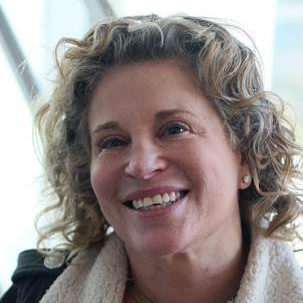While many women at Beit T’Shuvah know that Jill Rosenberg runs the women’s trauma group every Thursday at 11 o’clock, few realize how much meaning trauma holds for her. Before she began working at Beit T’Shuvah, Jill’s specialty was treating the trauma associated with rape. Between Santa Monica Hospital’s emergency room and the Stuart House located down the street from the hospital, Jill spent 15 years witnessing the realities of trauma firsthand. “Somehow being here feels like I’ve come full circle,” Jill says, referring to the journey that eventually led her to Beit T’Shuvah.
A “true Los Angeles local”, Jill grew up in a time where Helms Bakery trucks still made neighborhood rounds, although Jill’s mother would never lend her money to indulge in the tempting pastries they sold. When she graduated from Beverly Hills High School, Jill was drawn to the field of social work after a brief interstice of organizing film pre-screenings for the entertainment industry. A friend was in school completing a degree as a social worker, bursting many of Jill’s assumptions that social workers did little other than handing out welfare checks. Seeking her mother’s input, Jill announced to her family that she would be completing graduate school to either become a social worker or a lawyer. Her mother recommended that Jill go to law school and meet a nice Jewish lawyer to make her husband. “So I did the opposite,” says Jill, assuming that the wisest course of action was doing what her mom didn’t want.
Jill’s work in rape treatment and prevention began when she was hired to speak at high schools about the subject, which encompassed not only rape, but related concepts such as consent, drinking, and inappropriate touching. Part of the seminar included a segment for “individual time”, where she would be approached by students for one-on-one conversations that often resulted in first disclosures. “One of my most powerful stories,” Jill recalls, “is when a girl came up to me and told me that her stepfather was sexually assaulting her for years. It was the end of the school day and he walked in. She said ‘There he is! Lie! Tell him you are someone different!’ He came up, shook my hand, off she went, and I had to report it.”
The impact of making such a big difference in the lives of victims is what eventually led Jill to her work with the Santa Monica Hospital and their Stuart House. When a victim would be brought into the rape treatment center of the Santa Monica Hospital, Jill would be called to the ER, where she worked with the police and doctors as a support person. Remembering that time, Jill remarks, “I would always be on call, in the days when there were beepers. I would work from Friday night to Monday morning and if in the middle of the night the beeper went off—I’m still traumatized by that.” At Stuart House, Jill says, “I worked on a multidisciplinary team that prosecuted child sexual abuse. I was the one who got all the police reports and set up all the interviews.” While part of the group specialized in therapy for survivors, Jill’s role focused on the process of prosecuting perpetrators and supporting victims throughout the process.
Eventually, Jill put her work life on pause to focus on her home life. The process of starting a family occurred more rapidly than she’d expected: Jill became pregnant with fraternal twins on her honeymoon and decided to become a full-time mom. Jill’s children attended the same school as a woman named Mindy Freedman, leading to a friendship between the two moms. When Mindy eventually founded the SAM Initiative, Jill was on board with its philanthropic cause. Originally, the SAM Initiative started as a women’s giving circle, where each of the 50 members donated $2,500 to distribute to causes of their choosing. When the woman of the SAM Initiative began looking to give money to Beit T’Shuvah’s social enterprise Creative Matters, Jill met Harriet Rossetto and fell in love with the organization Harriet founded.
Jill has been working for Beit T’Shuvah for about a year, not only facilitating the women’s trauma group, but also supervising the therapist interns here. This work has given Jill some insight on how therapists feel behind the scenes: “Sometimes they’ll worry about a client not liking them, and I’m like, y’know I go through the same thing – do the people I supervise like me? It doesn’t matter how far we’ve come, we always seem to question ourselves.” As a whole, Jill sees what Beit T’Shuvah has to offer as unique in the world of recovery. Few other residential treatment centers integrate spirituality as a central component of healing, and Jill notices that many who successfully recover have embraced that aspect of the program. She also cites Beit T’Shuvah’s large and embracing community as offering valuable feedback, giving residents a sense of how they are being received in the world around them.
In her work with residents, Jill’s history of treating trauma has given her a unique perspective on addiction: “Working…especially in the women’s trauma group, people just feel so lost. People come here because they’re sort of lost souls. I don’t see it as the addiction, I see the addiction as a result of the issues.” Jill recognizes that the addiction is often an attempt to hide the pain underlying past experiences, issues that people often resist confronting. “It doesn’t really matter what you have materially, or what your outside looks like, the healing really comes from within,” she observes. Jill shows through her work here that supporting the inner healing of our community is more than just a talent; it’s a passion.
